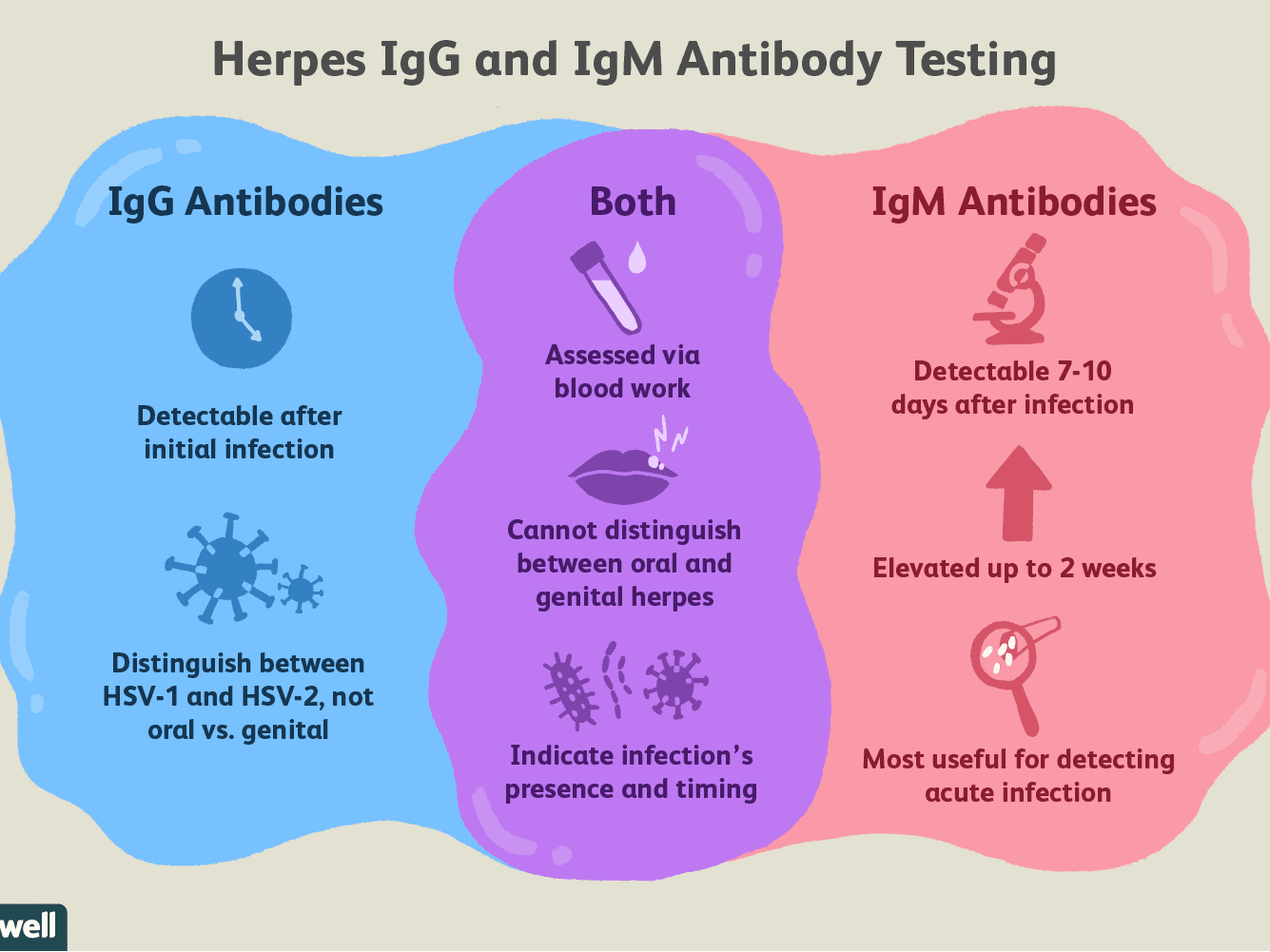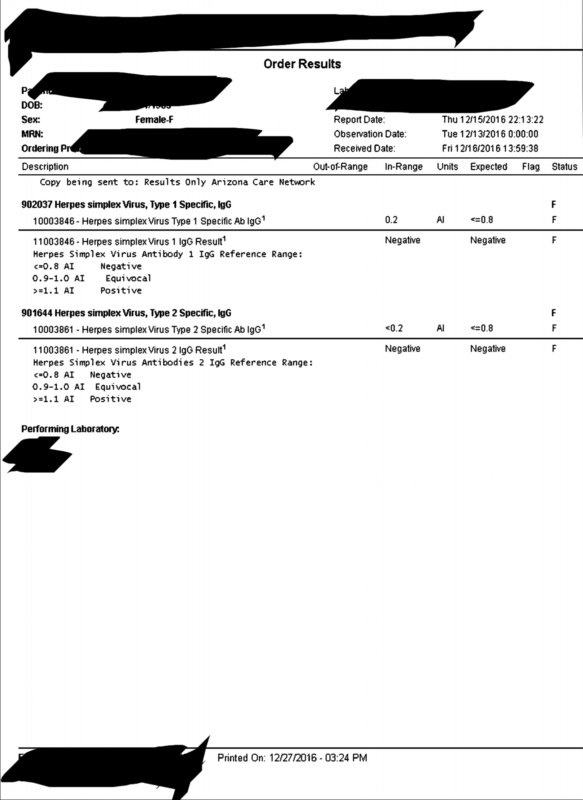There Are Two Common Blood Tests Used To Identify Herpes And They’re Often Misleading
“I had a patient once who underwent this test, which was positive, and was told she has herpes, which to her was devastating and life-altering,” Friedman says. “She burst into tears when I explained the significance or lack thereof with this test, which is very misleading.” There are two common blood tests used to identify herpes: IgG and IgM. The IgM test is still used by some doctors even though it has been denounced by the Centers for Disease Control and Prevention . According to the American Sexual Health Association , IgM tests can lead to deceptive results, as well as false assumptions about how and when a person acquired HSV.
And that’s not all: IgM tests fail to accurately distinguish between HSV-1 and HSV-2 antibodies, leading them to provide false-positive results for HSV-2. In other words, if you’ve been exposed to oral herpes , results of the IgM test could lead you to believe you’re positive for genital herpes, when in fact you simply have antibodies against HSV-1.
IgG tests, on the other hand, are more accurate, but aren’t without their own issues. For instance, ASHA says that while an IgG test can distinguish between HSV-1 and HSV-2, the problem is that the time it takes for IgG antibodies to reach a detectable level varies from person to person. This means that even with accurate results, someone could get a false-negative if they have the test administered too soon after contracting the virus .
Is Alzheimers Disease Related To Hsv
Alzheimers disease is a progressive brain disease that develops as a result of a complex series of events occurring in the brain over a long period of time. The causes of Alzheimers disease may include genetic, environmental, and other factors. Several different factors have been statistically linked to Alzheimers disease, including HSV-1 infection. However, some investigations suggest that viruses other than HSV-1 may influence Alzheimers disease. More research is needed to determine whether or not there is a causal link between HSV-1 infection and Alzheimers disease.
Type Of Tests Used To Diagnose Herpes
There are four main types of diagnostic tests that can be used to diagnose herpes. Your doctor will determine which type of test to use based on whether an outbreak is present or not.
If youre experiencing what you believe to be a herpes outbreak, your doctor can use a viral culture test or virus antigen detection test. If youre not experiencing symptoms, you can have an antibody test.
- Viral culture test.This test is used to determine if a sore contains the herpes virus. This test can sometimes produce a false-negative, meaning that it may not detect the virus even though its present.
- Virus antigen detection test. This test is used to determine if antigens to the herpes virus are present in a sore or lesion.
- Antibody test. If youre not experiencing an outbreak yet but still believe you may have been exposed, you can opt to have an antibody test performed. This test will only show a positive result if the antibodies to the virus have been developed. Therefore, this test isnt necessarily recommended for recent exposure.
- Polymerase chain reaction test. With this test, a healthcare provider can screen a sample of your blood or tissue from a sore. They can use this to determine if HSV is present and which type you have.
Also Check: How Can I Get Rid Of Herpes Simplex
The Bottom Line: Tests For Herpes Are More Worry Than They’re Worth
If you do have symptoms, don’t fret: If you know your status, you’re at an advantage in that you can talk with your doctor and find an antiviral drug that works for you. Medication can curtail the severity of your symptoms, as well as the number of outbreaks you get. Additionally, taking an antiviral daily will greatly reduce your chances of transmitting the virus to someone else. In case you missed it, there’s also a very promising new drug for herpes on the horizon, which researchers say could be the most effective one yet.
Take it straight from the pros and don’t put yourself through the stress of a herpes blood test if you don’t need to. And, whether you have symptoms or not, know that you’re not alone if you are herpes-positive.
Read more stories on herpes facts and myths:
Why Are There State

Syphilis, gonorrhea, and chlamydia are notifiable diseases in the United States, but herpes is not. A disease is notifiable if healthcare providers in all 50 states are required by law to report the diagnosis to their state or local health departments. CDC is also notified, and publishes state-by-state data for these infections. Because herpes infections are not notifiable infections by law, CDC is not able to provide state-by-state data. Public health surveillance for herpes infections is mainly done through population-based, national surveys, such as the National Health and Nutrition Examination Survey .
You May Like: How To Stop Genital Herpes
Nonetheless Asymptomatic Individuals Can Still Pass Herpes On And You Could Be One Of Them Even If You Obtain Regular Std Testing
Many doctors also don’t inform patients that the test is not included, so when people do have symptoms and receive a diagnosis, there can be feelings of confusion and worry about whether a partner was dishonest or cheated, when their partner simply may not have known about the infection. In fact, by the time some people are diagnosed, it can be very difficult to determine how long they’ve had the infection. This means they may not have contracted it from their current partner.
Questions For Your Doctor About Test Results
The following questions may be useful as patients review genital and oral herpes test results with their doctor:
- What type of test was conducted?
- What is my test result?
- What is the most likely explanation for my test result?
- Are there any follow-up tests that you recommend?
- How should I discuss my test result with sexual partners?
Also Check: What Is Suppressive Therapy For Herpes
Finding Out The Hard Way
No good data exist on how often patients with questionable positive results are actually re-tested. Until the 2015 update, CDC herpes testing guidelines had no mention of confirmatory testing for low-positive results, said Johnston. So patients often discovered the option not through their doctors, but through searching the web and reading online herpes forums.
That was the experience of Bryan, a 40-year-old man who lives in Indiana, who wrongly believed he had herpes for about two months in 2011. The misunderstanding actually put him at higher risk, he said: During those months he considered joining the hundreds of thousands of Americans on dating sites for herpes-positive people. Exclusively dating people with herpes would have increased his likelihood of contracting the virus.
The experience of YT, a 33-year-old mom who has suffered from frequent herpes symptoms over the last year, shows another side of the testing breakdown. She believes she was given HSV by a partner who didnt realize herpes wasnt included in his previous STD tests, she told STAT. Having herpes has caused her significant emotional trauma, and has driven her to permanently swear off dating. Had her partner known his true status, she wonders if her story would have been different.
People call and say, I just dont know whats going on, he said. Weve almost become de facto counselors.
How Common Herpes Really Is
Enough people have herpes to make it a totally commonplace infection, even though we may not treat it as one.
Nearly 48 percent of people aged 14 to 49 in the United States were estimated to have HSV-1 between 2015 and 2016, according to the most recent data from the CDC. This high prevalence makes sense because many people actually get the virus from nonsexual contact as children, the CDC explains. This can happen when a parent greets a child with a kiss on the mouth or while a kid is playing with other little ones, since children arent exactly known for their respect of personal space. Remember: HSV-1 often presents as cold sores, but its possible that some people with HSV-1 actually have genital herpes.
So, about genital herpes. You may have heard that one in six people has this infection. Thats a little bit of an outdated figure, Christine Johnston, M.D., an associate professor and herpes researcher at the University of Washington School of Medicine, tells SELF. That number is related to national survey data released by the CDC in 2010 and based on the years 2005 through 2008. This nationally representative research, published in the CDCs 2010 National Health and Nutrition Examination Survey , tested peoples blood samples for antibodies of HSV-1 and HSV-2, estimating that 16.2 percent of Americans aged 14 to 49 had HSV-2 between the years 2005 and 2008. Thats around one in six.
You May Like: How To Treat Painful Herpes Sores
Why It Is Done
A test for herpes may be done to:
- Find out whether HSV is causing sores around the mouth or in the genital area.
- Find out which virus type is causing sores around the mouth or in the genital area.
- Find out whether the sex partner of a person with genital herpes may be infected with HSV.
- Diagnose a herpes infection in a newborn baby whose mother has genital herpes.
Herpes Testing : What Are Your Options
Medically reviewed by Michele Emery, DNP
Are you worried you might have been exposed to the herpes virus?
First: don’t panic. The HSV viruses are a lot more common than you may think, and are very manageable in most cases.
Second: if you think youve been exposed to the herpes virus, testing is going to be your first plan of action.
Take a couple deep breaths and when you’re ready, read on.
Read Also: How Do You Stop Herpes From Spreading
Genital Herpes Is Common Why Doesnt Cdc Recommend Testing Everyone For This Std
CDC does not recommend herpes testing for people without symptoms. This is because diagnosing genital herpes in someone without symptoms has not shown any change in their sexual behavior nor has it stopped the virus from spreading. Also, false positive test results are possible. Even if you do not have symptoms, you should talk openly and honestly about your sexual history with your doctor to find out if you should be tested for any STDs, including herpes.
Although CDC does not recommend that everyone get tested for herpes, herpes testing may be useful in some situations. Herpes blood tests might be useful
- If you have genital symptoms that could be related to herpes,
- If you have a sex partner with genital herpes, or
- If you want a complete STD exam, especially if you have multiple sex partners.
Please note that while a herpes blood test can help determine if you have herpes infection, it will not be able to tell you who gave you the infection.
Is There Anything Else I Should Know

Herpes can make people more susceptible to HIV infection. The skin lesions give other sexually transmitted diseases , including HIV, openings for entering the body. Likewise, it can make HIV-infected individuals more infectious. Infection with HSV can also increase HIV viral load. HSV-2 infection is a significant opportunistic infection in HIV-infected individuals due to immune system deficiencies up to 90% of HIV-infected individuals are co-infected with HSV-2.
Recommended Reading: What Is The Most Effective Treatment For Herpes
When To Get Tested
What The Values Mean
What does that mean for you? How common herpes comes into the calculation. It affects how likely positive tests and negative tests are to be correct. In fact, it can make a bigger difference than herpes blood test accuracy!
Let us make the reasonable assumption that around 50% of the population are infected with HSV1. That’s the virus primarily associated with oral herpes and cold sores. It’s also associated with a growing number of genital herpes infections.
Then assume that 25% of people are infected with HSV2. That’s the virus primarily associated with genital herpes. In that scenario, the positive predictive value and negative predictive value are as follows.
ELISA:
- HSV-1: At least 94% of positive tests give the correct result, and at least 99% of negative test will be correct.
- HSV-2: At least 98% of positive tests are correct, and at least 97% of negative tests are correct.
Immunoblot:
- HSV-1: 95% of positive tests are correct, and 97% of negative tests are correct.
- HSV-2: 99% of positive tests are correct, and 99% of negative tests are correct.
Recommended Reading: How Can You Get Herpes 2
Are There Any Risks To The Test
There is no known risk to having a swab test.
There is very little risk to having a blood test. You may have slight pain or bruising at the spot where the needle was put in, but most symptoms go away quickly.
If you had a lumbar puncture, you may have pain or tenderness in your back where the needle was inserted. You may also get a headache after the procedure.
What Affects The Test
Reasons you may not be able to have the test or why the results may not be helpful include:
- If a culture sample is taken from a crusted, older sore.
- If a blood sample is taken before antibodies against HSV have formed. This period is called the window period or seroconversion period.
- If you are taking antiviral medicines, such as acyclovir, famciclovir, ganciclovir, or valacyclovir.
You May Like: Is Herpes Virus In Saliva
So Why Is This Test Not Included Doesnt The Medical Community Care About Preventing Transmission
Although it may not feel this way, the doctors and researchers who established these guidelines have been quite thoughtful about them. If you read the documents, you can see that the researchers sensitively consider their decision from many different angles. In fact, you can learn a ton about the research on genital herpes and transmission where they discuss the reasoning for their decision.
The biggest contributing factor to the guidelines is that 1) standard herpes blood tests are not totally reliable and 2) receiving a herpes diagnosis can have a significant impact on mental health while being virtually non-threatening to your physical health.
Heres Why Doctors Dont Usually Test For Herpes
Its basically a SELF mantra at this point: Getting tested for sexually transmitted infections is hella important. Is it the most delightful way to spend your time? No. Is it a vital part of looking after your health, sexual and otherwise? Absolutely.
When you go in for routine STI testing, you might realize that your doctor doesnt test you for herpes. Whats that about? As it turns out, testing for herpes isnt as straightforward as testing for something like chlamydia or gonorrhea. Here, doctors explain why herpes isnt usually included on STI panels.
Recommended Reading: Can You Catch Herpes From Saliva
Taking A Genital Or Oral Herpes Test
Testing for genital and oral herpes may be performed with a blood sample or a sample of fluid swabbed or scraped from a sore. Both types of samples are collected by a health professional when conducted at a doctors offices, clinic, or community organization.
If a patient is experiencing an outbreak, a doctor can collect a sample for testing by swabbing or scraping a sore. Material from the sore can be used for a herpes viral culture, PCR testing,
A Tzanck smear or an antibody test.
If a patient is not currently experiencing an outbreak, a blood test may be used to identify HSV antibodies. If a doctor suspects a brain infection with HSV, a lumbar puncture may be performed to obtain a sample of cerebrospinal fluid for analysis.
How Accurate Is A Herpes Blood Test

Herpes blood tests have a sensitivity level of about 80-98%. This type of test detects antibodies to the herpes virus, so it may not be as accurate when performed soon after infection. In general, false positives are a concern with herpes testing, so its not recommended unless you have symptoms or have a high risk for infection.
Also Check: Do You Ever Get Rid Of Herpes
Can Herpes Simplex Virus Cause Serious Infections
Yes. The most serious, or life-threatening, HSV infections can occur in newborns who are infected during birth and in individuals with weakened immune systems , such as organ transplant recipients and people with HIV/AIDS. Neonatal herpes is a serious condition, but also very rare. While 25-30% of pregnant women have genital herpes, less than 0.1% of babies born in the U.S. each year get neonatal herpes. This means that most women with genital herpes give birth to healthy babies.
HSV lesions tend to be more extensive and persist longer in newborns and immunocompromised people than in individuals who have healthy immune systems.
Wouldnt Testing Everyone Stop The Spread Of Genital Herpes
We dont know. There is no evidence that diagnosing genital herpes with a blood test in someone without symptoms would change their sexual behavior and stop the virus from spreading. In addition, without knowing the benefits of testing, the risk of shaming and stigmatizing people outweighs the potential benefits. For these reasons, testing everyone for herpes is not recommended at this time.
Read Also: Can People With Herpes Donate Blood